- Home
- Gillian Flynn
Gone Girl Page 6
Gone Girl Read online
Page 6
I am happy not to be in that club. I don’t partake, I don’t get off on emotional coercion, on forcing Nick to play some happy-hubby role – the shrugging, cheerful, dutiful taking out the trash, honey! role. Every wife’s dream man, the counterpoint to every man’s fantasy of the sweet, hot, laid-back woman who loves sex and a stiff drink.
I like to think I am confident and secure and mature enough to know Nick loves me without him constantly proving it. I don’t need pathetic dancing-monkey scenarios to repeat to my friends, I am content with letting him be himself.
I don’t know why women find that so hard.
When I get home from dinner, my cab pulls up just as Nick is getting out of his own taxi, and he stands in the street with his arms out to me and a huge grin on his face – ‘Baby!’ – and I run and I jump up into his arms and he presses a stubbly cheek against mine.
‘What did you do tonight?’ I ask.
‘Some guys were playing poker after work, so I hung around for a bit. Hope that was okay.’
‘Of course,’ I say. ‘More fun than my night.’
‘Who all showed up?’
‘Oh, Campbell and Insley and their dancing monkeys. Boring. You dodged a bullet. A really lame bullet.’
He squeezes me into him – those strong arms – and hauls me up the stairs. ‘God, I love you,’ he says.
Then comes sex and a stiff drink and a night of sleep in a sweet, exhausted rats’ tangle in our big, soft bed. Poor me.
NICK DUNNE
ONE DAY GONE
I didn’t listen to Go about the booze. I finished half the bottle sitting on her sofa by myself, my eighteenth burst of adrenaline kicking in just when I thought I’d finally go to sleep: My eyes were shutting, I was shifting my pillow, my eyes were closed, and then I saw my wife, blood clotting her blond hair, weeping and blind in pain, scraping herself along our kitchen floor. Calling my name. Nick, Nick, Nick!
I took repeated tugs on the bottle, psyching myself up for sleep, a losing routine. Sleep is like a cat: It only comes to you if you ignore it. I drank more and continued my mantra. Stop thinking, swig, empty your head, swig, now, seriously, empty your head, do it now, swig. You need to be sharp tomorrow, you need to sleep! Swig. I got nothing more than a fussy nap toward dawn, woke up an hour later with a hangover. Not a disabling hangover, but decent. I was tender and dull. Fuggy. Maybe still a little drunk. I stutterwalked to Go’s Subaru, the movement feeling alien, like my legs were on backward. I had temporary ownership of the car; the police had graciously accepted my gently used Jetta for inspection along with my laptop – all just a formality, I was assured. I drove home to get myself some decent clothes.
Three police cruisers sat on my block, our very few neighbors milling around. No Carl, but there was Jan Teverer – the Christian lady – and Mike, the father of the three-year-old IVF triplets – Taylor, Topher, and Talullah. (‘I hate them all, just by name,’ said Amy, a grave judge of anything trendy. When I mentioned that the name Amy was once trendy, my wife said, ‘Nick, you know the story of my name.’ I had no idea what she was talking about.)
Jan nodded from a distance without meeting my eyes, but Mike strode over to me as I got out of my car. ‘I’m so sorry, man, anything I can do, you let me know. Anything. I did the mowing this morning, so at least you don’t needta worry about that.’
Mike and I took turns mowing all the abandoned foreclosed properties in the complex – heavy rains in the spring had turned yards into jungles, which encouraged an influx of raccoons. We had raccoons everywhere, gnawing through our garbage late at night, sneaking into our basements, lounging on our porches like lazy house pets. The mowing didn’t seem to make them go away, but we could at least see them coming now.
‘Thanks, man, thank you,’ I said.
‘Man, my wife, she’s been hysterical since she heard,’ he said. ‘Absolutely hysterical.’
‘I’m so sorry to hear that,’ I said. ‘I gotta—’ I pointed at my door.
‘Just sitting around, crying over pictures of Amy.’
I had no doubt that a thousand Internet photos had popped up overnight, just to feed the pathetic needs of women like Mike’s wife. I had no sympathy for drama queens.
‘Hey, I gotta ask—’ Mike started.
I patted his arm and pointed again at the door, as if I had pressing business. I turned away before he could ask any questions and knocked on the door of my own house.
Officer Velásquez escorted me upstairs, into my own bedroom, into my own closet – past the silvery perfect-square gift box – and let me rifle through my things. It made me tense, selecting clothes in front of this young woman with the long brown braid, this woman who had to be judging me, forming an opinion. I ended up grabbing blindly: The final look was business-casual, slacks and short sleeves, like I was going to a convention. It would make an interesting essay, I thought, picking out appropriate clothes when a loved one goes missing. The greedy, angle-hungry writer in me, impossible to turn off.
I jammed it all into a bag and turned back around, looking at the gift box on the floor. ‘Could I look inside?’ I asked her.
She hesitated, then played it safe. ‘No, I’m sorry, sir. Better not right now.’
The edge of the gift wrapping had been carefully slit. ‘Has somebody looked inside?’
She nodded.
I stepped around Velásquez toward the box. ‘If it’s already been looked at then—’
She stepped in front of me. ‘Sir, I can’t let you do that.’
‘This is ridiculous. It’s for me from my wife—’
I stepped back around her, bent down, and had one hand on the corner of the box when she slapped an arm across my chest from behind. I felt a momentary spurt of fury, that this woman presumed to tell me what to do in my own home. No matter how hard I try to be my mother’s son, my dad’s voice comes into my head unbidden, depositing awful thoughts, nasty words.
‘Sir, this is a crime scene, you—’
Stupid bitch.
Suddenly her partner, Riordan, was in the room and on me too, and I was shaking them off – fine, fine, fuck – and they were forcing me down the stairs. A woman was on all fours near the front door, squirreling along the floorboards, searching, I assume for blood spatter. She looked up at me impassively, then back down.
I forced myself to decompress as I drove back to Go’s to dress. This was only one in a long series of annoying and asinine things the police would do in the course of this investigation (I like rules that make sense, not rules without logic), so I needed to calm down: Do not antagonize the cops, I told myself. Repeat if necessary: Do not antagonize the cops.
I ran into Boney as I entered the police station, and she said, ‘Your in-laws are here, Nick’ in an encouraging tone, like she was offering me a warm muffin.
Marybeth and Rand Elliott were standing with their arms around each other. Middle of the police station, they looked like they were posing for prom photos. That’s how I always saw them, hands patting, chins nuzzling, cheeks rubbing. Whenever I visited the Elliott home, I became an obsessive throat-clearer – I’m about to enter – because the Elliotts could be around any corner, cherishing each other. They kissed each other full on the mouth whenever they were parting, and Rand would cup his wife’s rear as he passed her. It was foreign to me. My parents divorced when I was twelve, and I think maybe, when I was very young, I witnessed a chaste cheek kiss between the two when it was impossible to avoid. Christmas, birthdays. Dry lips. On their best married days, their communications were entirely transactional: We’re out of milk again. (I’ll get some today.) I need this ironed properly. (I’ll do that today.) How hard is it to buy milk? (Silence.) You forgot to call the plumber. (Sigh.) Goddammit, put on your coat, right now, and go out and get some goddamn milk. Now. These messages and orders brought to you by my father, a mid-level phone-company manager who treated my mother at best like an incompetent employee. At worst? He never beat her, but his pure, inarticulate fury would
fill the house for days, weeks, at a time, making the air humid, hard to breathe, my father stalking around with his lower jaw jutting out, giving him the look of a wounded, vengeful boxer, grinding his teeth so loud you could hear it across the room. Throwing things near her but not exactly at her. I’m sure he told himself: I never hit her. I’m sure because of this technicality he never saw himself as an abuser. But he turned our family life into an endless road trip with bad directions and a rage-clenched driver, a vacation that never got a chance to be fun. Don’t make me turn this car around. Please, really, turn it around.
I don’t think my father’s issue was with my mother in particular. He just didn’t like women. He thought they were stupid, inconsequential, irritating. That dumb bitch. It was his favorite phrase for any woman who annoyed him: a fellow motorist, a waitress, our grade school teachers, none of whom he ever actually met, parent-teacher conferences stinking of the female realm as they did. I still remember when Geraldine Ferraro was named the 1984 vice presidential candidate, us all watching it on the news before dinner. My mother, my tiny, sweet mom, put her hand on the back of Go’s head and said, Well, I think it’s wonderful. And my dad flipped the TV off and said, It’s a joke. You know it’s a goddamn joke. Like watching a monkey ride a bike.
It took another five years before my mother finally decided she was done. I came home from school one day and my father was gone. He was there in the morning and gone by the afternoon. My mom sat us down at the dining table and announced, ‘Your father and I have decided it would be best for everyone if we live apart,’ and Go burst into tears and said, ‘Good, I hate you both!’ and then, instead of running to her room like the script called for, she went to my mom and hugged her.
So my father went away and my thin, pained mother got fat and happy – fairly fat and extremely happy – as if she were supposed to be that way all along: a deflated balloon taking in air. Within a year, she’d morphed into the busy, warm, cheerful lady she’d be till she died, and her sister said things like ‘Thank God the old Maureen is back,’ as if the woman who raised us was an imposter.
As for my father, for years I spoke to him on the phone about once a month, the conversations polite and newsy, a recital of things that happened. The only question my father ever asked about Amy was ‘How is Amy?,’ which was not meant to elicit any answer beyond ‘She’s fine.’ He remained stubbornly distant even as he faded into dementia in his sixties. If you’re always early, you’re never late. My dad’s mantra, and that included the onset of Alzheimer’s – a slow decline into a sudden, steep drop that forced us to move our independent, misogynistic father to a giant home that stank of chicken broth and piss, where he’d be surrounded by women helping him at all times. Ha.
My dad had limitations. That’s what my good-hearted mom always told us. He had limitations, but he meant no harm. It was kind of her to say, but he did do harm. I doubt my sister will ever marry: If she’s sad or upset or angry, she needs to be alone – she fears a man dismissing her womanly tears. I’m just as bad. The good stuff in me I got from my mom. I can joke, I can laugh, I can tease, I can celebrate and support and praise – I can operate in sunlight, basically – but I can’t deal with angry or tearful women. I feel my father’s rage rise up in me in the ugliest way. Amy could tell you about that. She would definitely tell you, if she were here.
I watched Rand and Marybeth for a moment before they saw me. I wondered how furious they’d be with me. I had committed an unforgivable act, not phoning them for so long. Because of my cowardice, my in-laws would always have that night of tennis lodged in their imagination: the warm evening, the lazy yellow balls bumping along the court, the squeak of tennis shoes, the average Thursday night they’d spent while their daughter was disappeared.
‘Nick,’ Rand Elliott said, spotting me. He took three big strides toward me, and as I braced myself for a punch, he hugged me desperately hard.
‘How are you holding up?’ he whispered into my neck, and began rocking. Finally, he gave a high-pitched gulp, a swallowed sob, and gripped me by the arms. ‘We’re going to find Amy, Nick. It can’t go any other way. Believe that, okay?’ Rand Elliott held me in his blue stare for a few more seconds, then broke up again – three girlish gasps burst from him like hiccups – and Marybeth moved into the huddle, buried her face in her husband’s armpit.
When we parted, she looked up at me with giant stunned eyes. ‘It’s just a – just a goddamn nightmare,’ she said. ‘How are you, Nick?’
When Marybeth asked How are you, it wasn’t a courtesy, it was an existential question. She studied my face, and I was sure she was studying me, and would continue to note my every thought and action. The Elliotts believed that every trait should be considered, judged, categorized. It all means something, it can all be used. Mom, Dad, Baby, they were three advanced people with three advanced degrees in psychology – they thought more before nine a.m. than most people thought all month. I remember once declining cherry pie at dinner, and Rand cocked his head and said, ‘Ahh! Iconoclast. Disdains the easy, symbolic patriotism.’ And when I tried to laugh it off and said, well, I didn’t like cherry cobbler either, Marybeth touched Rand’s arm: ‘Because of the divorce. All those comfort foods, the desserts a family eats together, those are just bad memories for Nick.’
It was silly but incredibly sweet, these people spending so much energy trying to figure me out. The answer: I don’t like cherries.
By eleven-thirty, the station was a rolling boil of noise. Phones were ringing, people were yelling across the room. A woman whose name I never caught, whom I registered only as a chattering bobblehead of hair, suddenly made her presence known at my side. I had no idea how long she’d been there: ‘… and the main point of this, Nick, is just to get people looking for Amy and knowing she has a family who loves her and wants her back. This will be very controlled. Nick, you will need to – Nick?’
‘Yep.’
‘People will want to hear a quick statement from her husband.’
From across the room, Go was darting toward me. She’d dropped me at the station, then run by The Bar to take care of bar things for thirty minutes, and now she was back, acting like she’d abandoned me for a week, zigzagging between desks, ignoring the young officer who’d clearly been assigned to usher her in, neatly, in a hushed, dignified manner.
‘Okay so far?’ Go said, squeezing me with one arm, the dude hug. The Dunne kids don’t perform hugs well. Go’s thumb landed on my right nipple. ‘I wish Mom was here,’ she whispered, which was what I’d been thinking. ‘No news?’ she asked when she pulled away.
‘Nothing, fucking nothing—’
‘You look like you feel awful.’
‘I feel like fucking shit.’ I was about to say what an idiot I was, not listening to her about the booze.
‘I would have finished the bottle, too.’ She patted my back.
‘It’s almost time,’ the PR woman said, again appearing magically.
‘It’s not a bad turnout for a July fourth weekend.’ She started herding us all toward a dismal conference room – aluminum blinds and folding chairs and a clutch of bored reporters – and up onto the platform. I felt like a third-tier speaker at a mediocre convention, me in my business-casual blues, addressing a captive audience of jet-lagged people daydreaming about what they’d eat for lunch. But I could see the journalists perk up when they caught sight of me – let’s say it: a young, decent-looking guy – and then the PR woman placed a cardboard poster on a nearby easel, and it was a blown-up photo of Amy at her most stunning, that face that made you keep double-checking: She can’t be that good-looking, can she? She could, she was, and I stared at the photo of my wife as the cameras snapped photos of me staring at the photo. I thought of that day in New York when I found her again: the blond hair, the back of her head, was all I could see, but I knew it was her, and I saw it as a sign. How many millions of heads had I seen in my life, but I knew this was Amy’s pretty skull floating down Seventh Avenue in f
ront of me. I knew it was her, and that we would be together.
Cameras flashed. I turned away and saw spots. It was surreal. That’s what people always say to describe moments that are merely unusual. I thought: You have no fucking idea what surreal is. My hangover was really warming up now, my left eye throbbing like a heart.
The cameras were clicking, and the two families stood together, all of us with mouths in thin slits, Go the only one looking even close to a real person. The rest of us looked like placeholder humans, bodies that had been dollied in and propped up. Amy, over on her easel, looked more present. We’d all seen these news conferences before – when other women went missing. We were being forced to perform the scene that TV viewers expected: the worried but hopeful family. Caffeine-dazed eyes and ragdoll arms.
My name was being said; the room gave a collective gulp of expectation. Showtime.
When I saw the broadcast later, I didn’t recognise my voice. I barely recognised my face. The booze floating, sludgelike, just beneath the surface of my skin made me look like a fleshy wastrel, just sensuous enough to be disreputable. I had worried about my voice wavering, so I overcorrected and the words came out clipped, like I was reading a stock report. ‘We just want Amy to get home safe …’ Utterly unconvincing, disconnected. I might as well have been reading numbers at random.
Rand Elliott stepped up and tried to save me: ‘Our daughter, Amy, is a sweetheart of a girl, full of life. She’s our only child, and she’s smart and beautiful and kind. She really is Amazing Amy. And we want her back. Nick wants her back.’ He put a hand on my shoulder, wiped his eyes, and I involuntarily turned steel. My father again: Men don’t cry.
Rand kept talking: ‘We all want her back where she belongs, with her family. We’ve set up a command center over at the Days Inn …’
The news reports would show Nick Dunne, husband of the missing woman, standing metallically next to his father-in-law, arms crossed, eyes glazed, looking almost bored as Amy’s parents wept. And then worse. My longtime response, the need to remind people I wasn’t a dick, I was a nice guy despite the affectless stare, the haughty, douchebag face.
So there it came, out of nowhere, as Rand begged for his daughter’s return: a killer smile.
AMY ELLIOTT DUNNE
JULY 5, 2010
– Diary entry –
I won’t blame Nick. I don’t blame Nick. I refuse – refuse! – to turn into some pert-mouthed, strident angry-girl. I made two promises to myself when I married Nick. One: no dancing-monkey demands. Two: I would never, ever say, Sure, that’s fine by me (if you want to stay out later, if you want to do a boys’ weekend, if you want to do something you want to do) and then punish him for doing what I said was fine by me. I worry I am coming perilously close to violating both of those promises.
But still. It is our third wedding anniversary and I am alone in our apartment, my face all mask-tight from tears because, well, because: Just this afternoon, I get a voice mail from Nick, and I already know it’s going to be bad, I know the second the voice mail begins because I can tell he’s calling from his cell and I can hear men’s voices in the background and a big, roomy gap, like he’s trying to decide what to say, and then I hear his taxi-blurred voice, a voice that is already wet and lazy with booze, and I know I am going to be angry – that quick inhale, the lips going tight, the shoulders up, the I so don’t want to be mad but I’m going to be feeling. Do men not know that feeling? You don’t want to be mad, but you’re obligated to be, almost. Because a rule, a good rule, a nice rule is being broken. Or maybe rule is the wrong word. Protocol? Nicety? But the rule/protocol/nicety – our anniversary – is being broken for a good reason, I understand, I do. The rumors were true: Sixteen writers have been laid off at Nick’s magazine. A third of the staff. Nick has been spared, for now, but of course he feels obliged to take the others out to get drunk. They are men, piled in a cab, heading down Second Avenue, pretending to be brave. A few have gone home to their wives, but a surprising number have stayed out. Nick will spend the night of our anniversary buying these men drinks, going to strip clubs and cheesy bars, flirting with twenty-two-year-olds (My friend here just got laid off, he could use a hug). These jobless men will proclaim Nick a great guy as he buys their drinks on a credit card linked to my bank account. Nick will have a grand old time on our anniversary, which he didn’t even mention in the message. Instead, he said, I know we had plans but …
I am being a girl. I just thought it’d be a tradition: All across town, I have strewn little love messages, reminders of our past year together, my treasure hunt. I can picture the third clue, fluttering from a piece of scotch tape in the crook of the V of the Robert Indiana love sculpture up near Central Park. Tomorrow, some bored twelve-year-old tourist stumbling along behind his parents is going to pick it off, read it, shrug, and let it float away like a gum wrapper.
My treasure-hunt finale was perfect, but isn’t now. It’s an absolutely gorgeous vintage briefcase. Leather. Third anniversary is leather. A work-related gift may be a bad idea, given that work isn’t exactly happy right now. In our kitchen, I have two live lobsters, like always. Or like what was supposed to be like always. I need to phone my mom and see if they can keep for a day, scrambling dazedly around their crate, or if I need to stumble in, and with my wine-lame eyes, battle them and boil them in my pot for no good reason. I’m killing two lobsters I won’t even eat.
Dad phoned to wish us happy anniversary, and I picked up the phone and I was going to play it cool, but then I started crying when I started talking – I was doing the awful chick talk-cry: mwaha-waah-gwwahh-and-waaa-wa – so I had to tell him what happened, and he told me I should open a bottle of wine and wallow in it for a bit. Dad is always a proponent of a good indulgent sulk. Still, Nick will be angry that I told Rand, and of course Rand will do his fatherly thing, pat Nick on the shoulder and say, ‘Heard you had some emergency drinking to do on your anniversary, Nicky.’ And chuckle. So Nick will know, and he will be angry with me because he wants my parents to believe he’s perfect – he beams when I tell them stories about what a flawless son-in-law he is.
Except for tonight. I know, I know, I’m being a girl.
It’s five a.m. The sun is coming up, almost as bright as the streetlights outside that have just blinked off. I always like that switch, when I’m awake for it. Sometimes, when I can’t sleep, I’ll pull myself out of bed and walk through the streets at dawn, and when the lights click off, all together, I always feel like I’ve seen something special. Oh, there go the streetlights! I want to announce. In New York it’s not three or four a.m. that’s the quiet time – there are too many bar stragglers, calling out to each other as they collapse into taxis, yelping into their cell phones as they frantically smoke that one last cigarette before bed. Five a.m., that’s the best time, when the clicking of your heels on the sidewalk sounds illicit. All the people have been put away in their boxes, and you have the whole place to yourself.
Here’s what happened: Nick got home just after four, a bulb of beer and cigarettes and fried-egg odor attached to him, a placenta of stink. I was still awake, waiting for him, my brain ca-thunking after a marathon of Law and Order. He sat down on our ottoman and glanced at the present on the table and said nothing. I stared at him back. He clearly wasn’t going to even graze against an apology – hey, sorry things got screwy today. That’s all I wanted, just a quick acknowledgment.
‘Happy day after anniversary,’ I start.
He sighs, a deep aggrieved moan. ‘Amy, I’ve had the crappiest day ever. Please don’t lay a guilt trip on me on top of it.’
Nick grew up with a father who never, ever apologised, so when Nick feels he has screwed up, he goes on offense. I know this, and I can usually wait it out, usually.
‘I was just saying happy anniversary.’

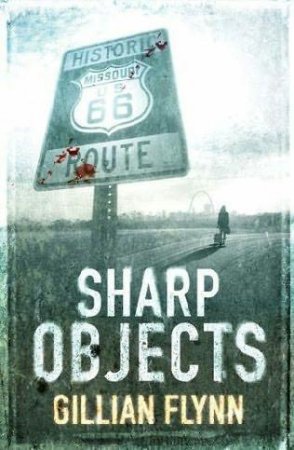 Sharp Objects
Sharp Objects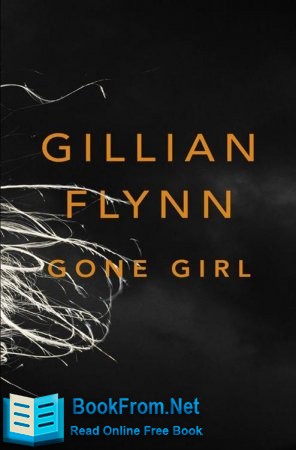 Gone Girl
Gone Girl Dark Places
Dark Places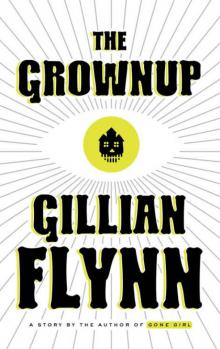 The Grownup
The Grownup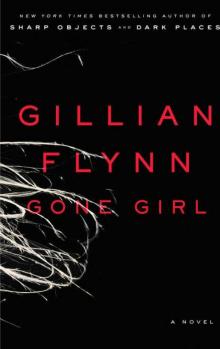 Gone Girl: A Novel
Gone Girl: A Novel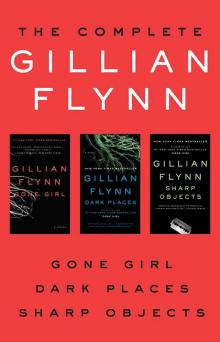 The Complete Gillian Flynn
The Complete Gillian Flynn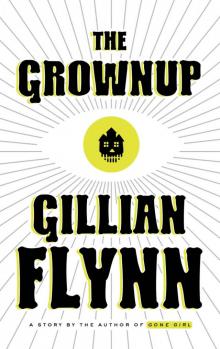 The Grownup: A Story by the Author of Gone Girl (Kindle Single)
The Grownup: A Story by the Author of Gone Girl (Kindle Single)